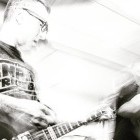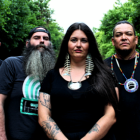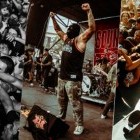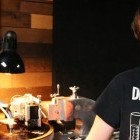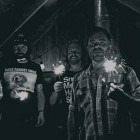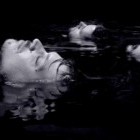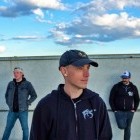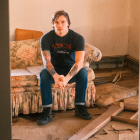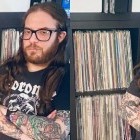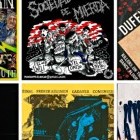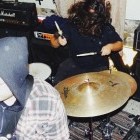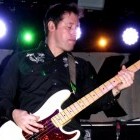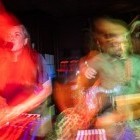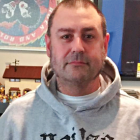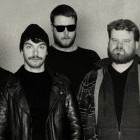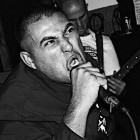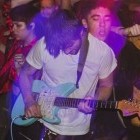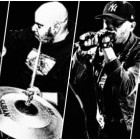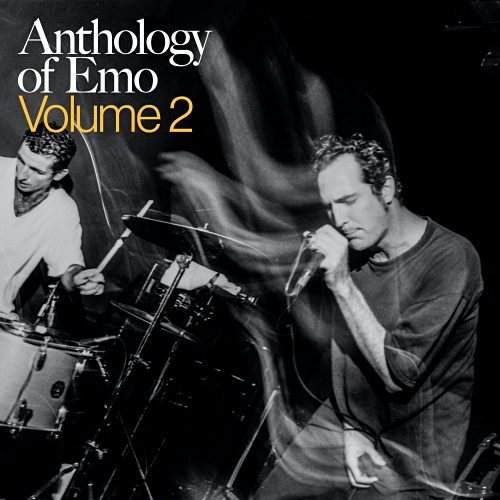
Earlier this month, it was announced that the second volume in the Anthology of Emo book series was being released this September. Written by WashedUpEmo.com founder Tom Mullen, the next installment will feature interviews with such musicians as Jim Adkins (Jimmy Eat World), Bob Nanna (Braid), and Chris Conley (Saves the Day).
The first volume of Anthology of Emo was released in 2017 and will be reprinted for those who missed out the first time around. Both volumes will be available separately or as a specially-priced bundle with a limited poster.
In this No Echo exclusive, we're sharing an exclusive excerpt from Mullen's interview with the late Jon Bunch (Sense Field, Reason to Believe, Further Seems Forever, Lucky Scars, War Generation).
I had the pleasure of becoming friends with Bunch after my old band toured with Further Seems Forever when he briefly fronted them in the '00s and can attest to his kindness and sharp sense of humor.
The interview below was done by Mullen right before Bunch's untimely passing in 2016.
***
From Anthology of Emo: Volume 2:
Jon Bunch: I remember when Sense Field was still together, there was this pizza shop around the corner from where I was living, and there was this dude who… he was kind of in this hippie jam band and I would just like shoot the shit with them about music and stuff like that. He just popped up one day — he didn't really know anything about my background or anything like that — and he's like, "yeah, we're gonna change our style and we're doing this like emo thing 'cause I guess that's like the popular thing, and we want to get signed."
And I was like, "wow. You know, that's crazy that people have no relationship whatsoever to what it is and they're just starting a band because it's popular." Yeah, it definitely became commercialized. It became very weird, like almost surreal. But you know, it's weird because the same thing happened with punk.
Tom Mullen: Oh yeah, definitely. I just think the weird thing is that punk is still cool. When you say punk, you say "Ramones" when you say emo, people say "x band" that I've mentioned a million times on the podcast. My hope to God is that when I'm 90 and people say the word, I hope that they say "Sunny Day Real Estate," or they say something about an indie band, verses saying that. I don't know if it'll ever happen, but I just hope that maybe you'll know the whole history.
I feel like punk got a pass. Like yes, you might say "Green Day," but you're gonna still say "The Ramones."
Bunch: Right. And you know, the weird thing was back in the day when we first started listening to punk, it wasn't cool to be a punker, and most people would say punk sucked.
Mullen: Was that the '80s? Was this in LA? Was it more like— was it dance? Was it all the disco stuff? What was sort of happening then, outside of the punk scene, what was sort of pop?
Bunch: I mean, there was the disco era of the late '70s, but then there was the new wave era.
Mullen: New Wave was what I was thinking of, sorry.
Bunch: Yeah. I mean punk was underground. I mean, there were some radio shows like "Rodney on the ROQ" that would play the Circle Jerks or The Germs or Alice Bags in the late seventies and stuff like that. And the Ramones and The Clash and the Sex Pistols and Generation X and stuff like that. You know, if were a punk— it's funny when you were saying how a kid might go through a period where he's listening to emo, doesn't have any history of it, doesn't even know that emo stands for "emotional hardcore," doesn't know anything, and then it's out of his life for good.
I used to always trip out on someone who would be into punk but would be into other music too. I'd say I was like a second- or third-generation punk rock kid from LA — if Black Flag started in '77 and that was considered punk.
Punk was more of an art scene in the late '70s. If you hear the old cats talk about it, you know, bands like X, it was more about artists and there wasn't as much violence. It was scary, but it was more about the art and they kinda called it the "Art Era." New wave and punk was kind of mixed together. So a new wave band might play with a punk band, and the new wave band might be called a punk band. The punk band might be called a new wave band. There were no defining lines.
Then hardcore punk started right around '80, if you exclude bands like the Bad Brains or Black Flag. But the "Hardcore Era" was from like '80 to '83. I would hear these songs and I'd hear other kids play it, but I was just 10-years-old. I didn't really understand it. But we really started listening to it in '83 — like "listening" listening to it. And then we started going to shows around then. I sort of consider I missed the first two eras of what punk was, and then witnessing LA punk's funeral as it were. Watching the scene sort of die in front of me. It like died and then regurgitated and came back as like a zombie, you know?
Mullen: Yeah. But then with punk itself and that term — and going back to the term emo — no one wants to be associated with it. No one. I mean, punk was like, "yeah, I'm a punk." "I'm hardcore." But this specific word— you know, there've been some articles written that are like, "oh, I was an emo kid. That was back then. Hahaha." I'm like, wait a minute. There was actually a seriousness to it. There was a community. When Sense Field was on Revelation, listening to the compilation In-Flight Program — the diversity at that time.
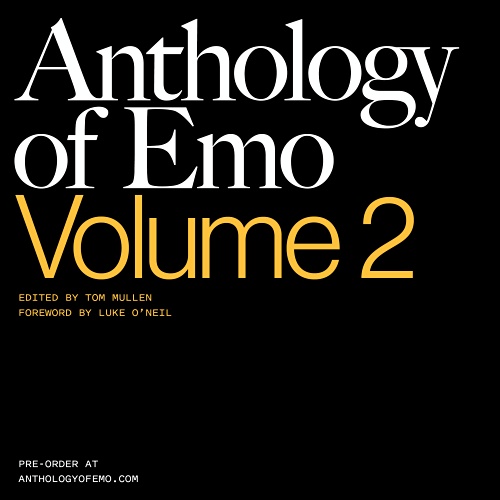
Bunch: There was a scene, dude. It was a real scene. The first guys that called us emo were Sick of It All.
Mullen: Hahaha! I love Sick of It All.
Bunch: That was probably around '94 or something like that. And they said it kind of as a jab, but they also recognized that it was a branch of hardcore from the hardcore tree. They knew it was part of the scene. It wasn't a separate thing. It was rooted in punk rock and rooted in hardcore in its own way. Most all of the kids had a complete history and background of punk and hardcore music.
Mullen: Those bands played together.
Bunch: Yeah. Those bands played together. We played with Sick of It All a bunch of times.
Mullen: You were definitely different on that comp. It wasn't screaming. Where did that come from? When you guys were sort of getting together? If it was the self-titled record? I just think when you put it on against everything else in '94 and '95 it was completely different.
Bunch: Well, it's funny. I talk to Dan O'Mahony — he's from the band No For An Answer, and he's in a band called Done Dying right now — and he always talks about singing. You know, we're both singers — he's a screamer — and we're always like, "where did you get the idea of starting to sing in punk?" If you listen to the Reason to Believe 7-inch — Reason to Believe being the band that I was in in high school, the hardcore band — there was a lot of singing in it, but I was like screaming-singing.
But really, if you listen to the older bands like The Misfits, you know, Danzig's singing. And if you listen to a lot of the old punk rock, there's a lot of singing in it. The band Scream from Washington DC on Discord, Pete Stahl was a great singer. HR would sing. There was singing involved. The Clash sang. Joey Ramone sang. Greg Graffin from Bad Religion, he sings.
Those are the bands we grew up on. So to me, it wasn't that big of a leap to sing in the music because that's what the singers were doing in all my favorite bands. So I just was just following that lead. You know, I did try to scream a lot in Reason to Believe, and I'd try to sound like Jerry A from Poison Idea. But I could be spitting up blood and couldn't talk for two days. It just wasn't my thing, you know.
Mullen: I mean the bands at that time and that you were connected with with Revelation Records — I mean bands like Into Another, Texas Is the Reason, Far — those were all just… I know that that's happening today. I think in the 2010s there's a lot of these bands that are different sounding — if it's a shoegaze band or a twinkle band — they're all kind of connected. I felt like Revelation at that time ('96), the tours, were "we are friends and we're connected."
Bunch: And not only that, but all the kids in the crowd were friends. Everybody knew each other. It was like a real scene. It was a thriving scene. Everyone knew each other. Most of the guys were in bands. They were mostly in hardcore bands.
One of the reasons why [Sense Field] caught on at shows was that we would play with hardcore bands, but we were the one band on the bill that the girls could come down onto the floor and watch us without worrying about getting beaten up or getting their nose broken. And this is totally how I see it Mullen: the guys would see the girls liking our band and they wanted their girlfriends and their friends that were girls to like their band, and then they would end up changing their sound and doing more of a Mineral and Sunny Day [Real Estate] thing.
Mullen: Like "post [hardcore]."
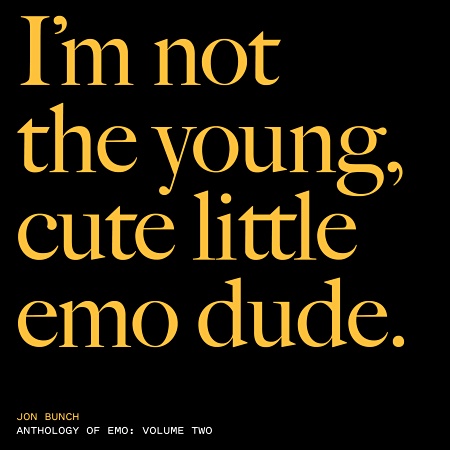
Bunch: Yeah. Our sound wasn't really the easiest to copy because we had so many different styles of songs. But, when I think of the early years of emo and what was the guiding light for most bands when they would hear the Sunny Day stuff, they would just take that record and kind of try to form that sound.
So, when we started touring more, we'd come back around to a town and a band that we had played with that was a hardcore band before would be like, "yeah, we broke up and we started a new band," and they'd be doing the Sunny Day thing. I really, really, really believe that it had to do with the fact that they wanted girls to like their bands. That was definitely part of the factor. Are we recording by the way?
Mullen: Yeah!
Bunch: Oh, okay. Hahaha!
Mullen: Hell yeah, man!
Bunch: Yeah, man. You're professional. So, I really think that that was a big part of it. It's kind of funny to look at it that way, but I think it's true.
Mullen: I always thought "post" was like that. I just thought you had the hardcore bands, but then the post-hardcore band would be a little bit bigger, a little bit slower, maybe singing and some screaming, more epic sounding. It seemed like that was a bridge that I think a lot of people were into. If you were just going to be, you know — and I love Madball — but if it was just going to be Madball and Sick of It All bands, I think some people get like, "alright, I need to like relax for a minute."
Bunch: Right, right. Yeah. And you know, the post-hardcore label and the emo label was the same in the early years. They would say like, "oh, they're a post-hardcore band or they're an emo band." Like I said, when Sick of It All called us emo, they were making fun of us in a respectful way. But they did recognize that there was a real scene behind it. All those hardcore kids that were part of that emo scene loved Sick of It All as well. There weren't dividing lines.
And the best part about that whole era and that scene was coming out of the LA punk rock scene with all the gangs and the violence — you wouldn't believe how ultra violent the shows were — think I was like 18 or 19 when Sense Field started — I wanted to be part of a new scene where there wasn't violence and there wasn't gangs and people getting beaten up. That was the beauty of it all for me. We were now part of this new generation of kids that got it. There wasn't any of that old stuff.
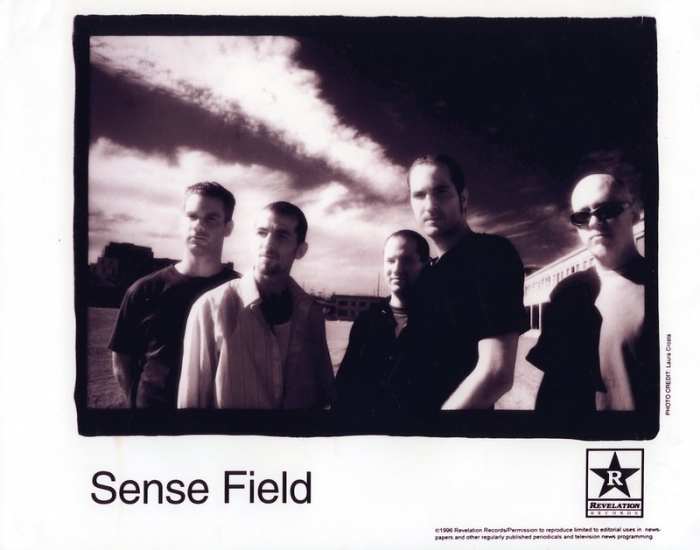
Mullen: You're right. I really actually didn't think of that until now. I mean a hardcore show had certain things to it: there was a gang there or there was an FSU (Friends Stand United) crew. And you were like, "wait a minute. I want to be at a show that isn't that," or just has different bands. For Sense Field, you guys transcended. I mean, that Mineral / Jimmy Eat World split is still talked about. You toured with all those bands.
You were there during the boom in the late '90s, a time I think a lot of people — especially those that listen to this — revere. But also you were there and you had the signing. You were signed to Warner Bros. You had the classic story of fighting to get your record back and sitting there for five years. Can you talk about that?
Bunch: Yeah. That's exactly what happened. We signed I think in '96 and — you know the history of the industry fairly well, I'm sure — but once we signed, everyone that brought us over got let go. They just gutted the whole building and restructured. The recordings that we made were kind of stuck. All the new people wanted to bring in their old bands.
Then eventually we got let go. We were able to re-record the music. Our guitar player Chris got a Pro Tools set and we just ended up re-recording everything. Then we got re-signed. It took a long time. It did. It took four years, five years, or whatever.
Mullen: That's an eternity for a band.
Bunch: It is an eternity for a band, and it hurt us bad. Should we have broken up back then? Maybe… probably… I don't know. It's kinda hard to say. Emo bands don't have a problem with breaking up. [Chuckles] It kind of adds to their mystique.
***
Anthology of Emo: Volume 2 will be out in September. Pre-order the book today via Polyvinyl Records.
For more info and exclusives from the book, hit the official Anthology of Emo website.
***
Donate a few bucks to help with No Echo's operating costs:
***

